Evaluating Emotional Intelligence in Health and Social Care Settings
VerifiedAdded on 2022/03/12
|10
|4245
|33
Report
AI Summary
This report provides a comprehensive review of the importance of emotional intelligence in healthcare, examining its impact on patient-centered care and the quality of professional practice. The report begins with an introduction and evaluates four sources using the CARS checklist, assessing their currency, credibility, scope, and intended audience. It then delves into the significance of emotional intelligence, highlighting its role in building relationships, managing stress, and improving communication between healthcare professionals and patients. The report introduces and discusses the five key components of emotional intelligence: self-awareness, self-regulation, self-motivation, empathy, and nurturing relationships, providing detailed explanations and examples for each. The report also includes a Personal Development Plan, reflecting on personal qualities and transferable skills essential for employability in the healthcare sector. The analysis emphasizes the need for emotional intelligence to enhance patient satisfaction, improve job performance, and foster effective leadership within healthcare organizations.
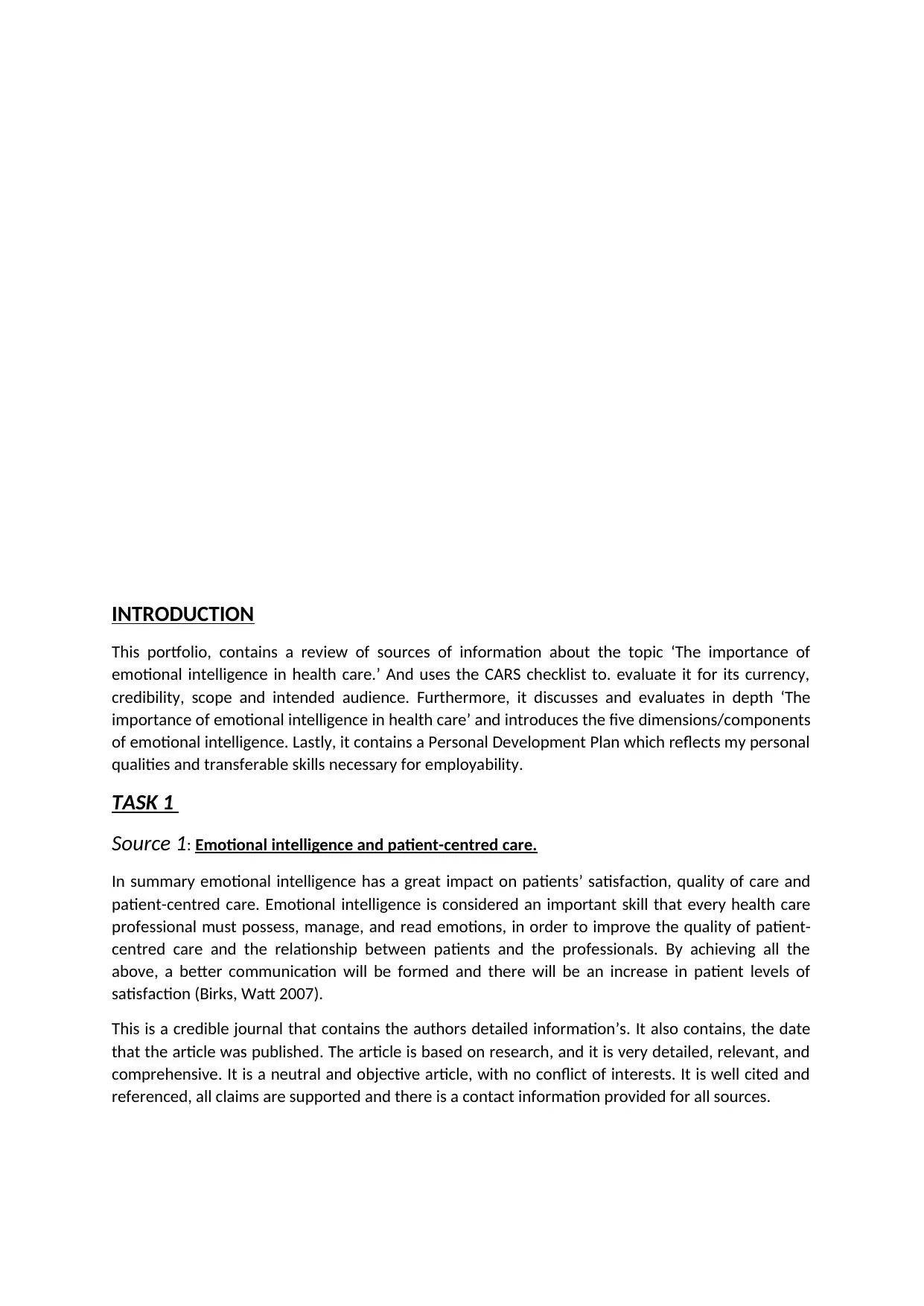
INTRODUCTION
This portfolio, contains a review of sources of information about the topic ‘The importance of
emotional intelligence in health care.’ And uses the CARS checklist to. evaluate it for its currency,
credibility, scope and intended audience. Furthermore, it discusses and evaluates in depth ‘The
importance of emotional intelligence in health care’ and introduces the five dimensions/components
of emotional intelligence. Lastly, it contains a Personal Development Plan which reflects my personal
qualities and transferable skills necessary for employability.
TASK 1
Source 1: Emotional intelligence and patient-centred care.
In summary emotional intelligence has a great impact on patients’ satisfaction, quality of care and
patient-centred care. Emotional intelligence is considered an important skill that every health care
professional must possess, manage, and read emotions, in order to improve the quality of patient-
centred care and the relationship between patients and the professionals. By achieving all the
above, a better communication will be formed and there will be an increase in patient levels of
satisfaction (Birks, Watt 2007).
This is a credible journal that contains the authors detailed information’s. It also contains, the date
that the article was published. The article is based on research, and it is very detailed, relevant, and
comprehensive. It is a neutral and objective article, with no conflict of interests. It is well cited and
referenced, all claims are supported and there is a contact information provided for all sources.
This portfolio, contains a review of sources of information about the topic ‘The importance of
emotional intelligence in health care.’ And uses the CARS checklist to. evaluate it for its currency,
credibility, scope and intended audience. Furthermore, it discusses and evaluates in depth ‘The
importance of emotional intelligence in health care’ and introduces the five dimensions/components
of emotional intelligence. Lastly, it contains a Personal Development Plan which reflects my personal
qualities and transferable skills necessary for employability.
TASK 1
Source 1: Emotional intelligence and patient-centred care.
In summary emotional intelligence has a great impact on patients’ satisfaction, quality of care and
patient-centred care. Emotional intelligence is considered an important skill that every health care
professional must possess, manage, and read emotions, in order to improve the quality of patient-
centred care and the relationship between patients and the professionals. By achieving all the
above, a better communication will be formed and there will be an increase in patient levels of
satisfaction (Birks, Watt 2007).
This is a credible journal that contains the authors detailed information’s. It also contains, the date
that the article was published. The article is based on research, and it is very detailed, relevant, and
comprehensive. It is a neutral and objective article, with no conflict of interests. It is well cited and
referenced, all claims are supported and there is a contact information provided for all sources.
Paraphrase This Document
Need a fresh take? Get an instant paraphrase of this document with our AI Paraphraser
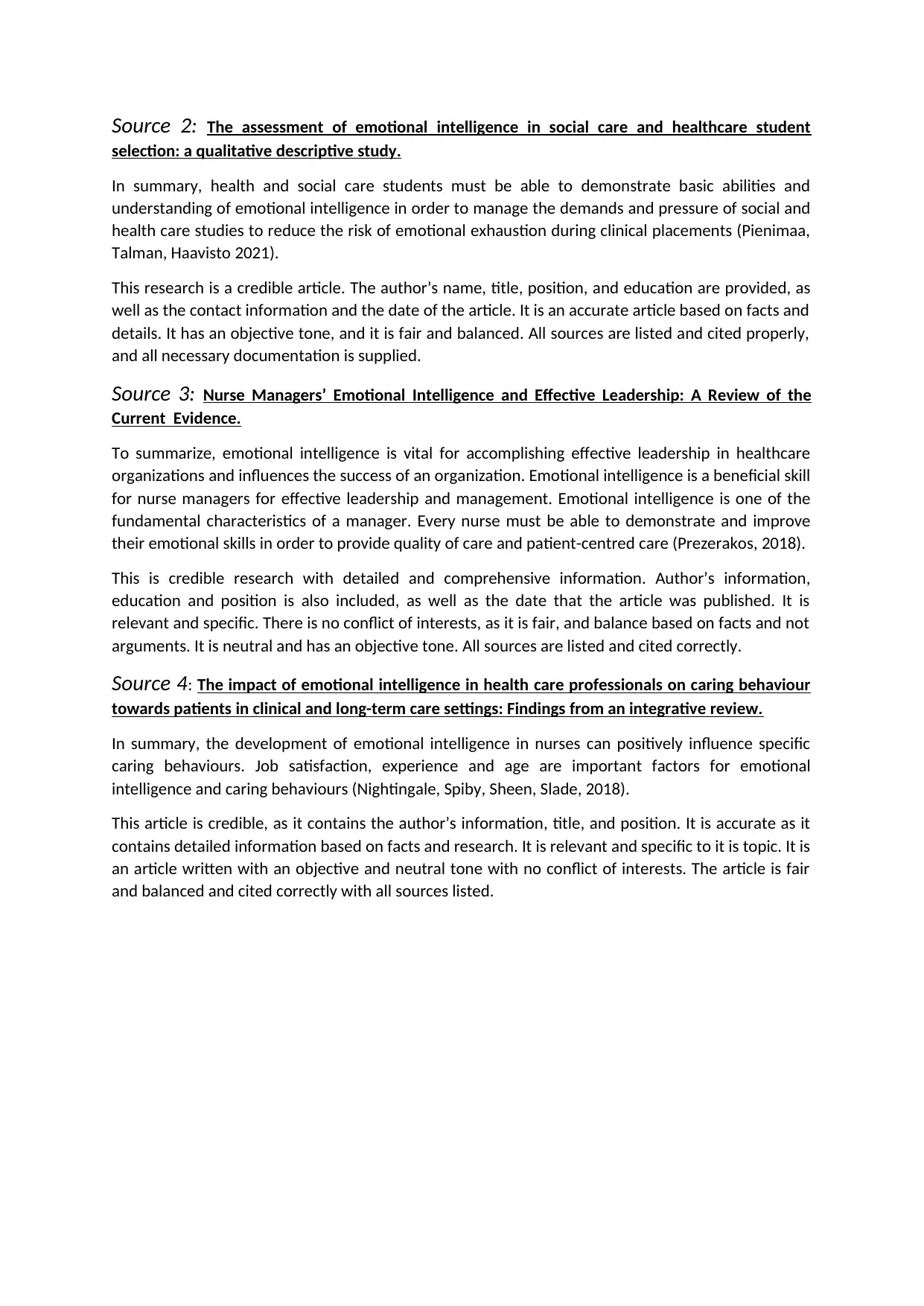
Source 2: The assessment of emotional intelligence in social care and healthcare student
selection: a qualitative descriptive study.
In summary, health and social care students must be able to demonstrate basic abilities and
understanding of emotional intelligence in order to manage the demands and pressure of social and
health care studies to reduce the risk of emotional exhaustion during clinical placements (Pienimaa,
Talman, Haavisto 2021).
This research is a credible article. The author’s name, title, position, and education are provided, as
well as the contact information and the date of the article. It is an accurate article based on facts and
details. It has an objective tone, and it is fair and balanced. All sources are listed and cited properly,
and all necessary documentation is supplied.
Source 3: Nurse Managers’ Emotional Intelligence and Effective Leadership: A Review of the
Current Evidence.
To summarize, emotional intelligence is vital for accomplishing effective leadership in healthcare
organizations and influences the success of an organization. Emotional intelligence is a beneficial skill
for nurse managers for effective leadership and management. Emotional intelligence is one of the
fundamental characteristics of a manager. Every nurse must be able to demonstrate and improve
their emotional skills in order to provide quality of care and patient-centred care (Prezerakos, 2018).
This is credible research with detailed and comprehensive information. Author’s information,
education and position is also included, as well as the date that the article was published. It is
relevant and specific. There is no conflict of interests, as it is fair, and balance based on facts and not
arguments. It is neutral and has an objective tone. All sources are listed and cited correctly.
Source 4: The impact of emotional intelligence in health care professionals on caring behaviour
towards patients in clinical and long-term care settings: Findings from an integrative review.
In summary, the development of emotional intelligence in nurses can positively influence specific
caring behaviours. Job satisfaction, experience and age are important factors for emotional
intelligence and caring behaviours (Nightingale, Spiby, Sheen, Slade, 2018).
This article is credible, as it contains the author’s information, title, and position. It is accurate as it
contains detailed information based on facts and research. It is relevant and specific to it is topic. It is
an article written with an objective and neutral tone with no conflict of interests. The article is fair
and balanced and cited correctly with all sources listed.
selection: a qualitative descriptive study.
In summary, health and social care students must be able to demonstrate basic abilities and
understanding of emotional intelligence in order to manage the demands and pressure of social and
health care studies to reduce the risk of emotional exhaustion during clinical placements (Pienimaa,
Talman, Haavisto 2021).
This research is a credible article. The author’s name, title, position, and education are provided, as
well as the contact information and the date of the article. It is an accurate article based on facts and
details. It has an objective tone, and it is fair and balanced. All sources are listed and cited properly,
and all necessary documentation is supplied.
Source 3: Nurse Managers’ Emotional Intelligence and Effective Leadership: A Review of the
Current Evidence.
To summarize, emotional intelligence is vital for accomplishing effective leadership in healthcare
organizations and influences the success of an organization. Emotional intelligence is a beneficial skill
for nurse managers for effective leadership and management. Emotional intelligence is one of the
fundamental characteristics of a manager. Every nurse must be able to demonstrate and improve
their emotional skills in order to provide quality of care and patient-centred care (Prezerakos, 2018).
This is credible research with detailed and comprehensive information. Author’s information,
education and position is also included, as well as the date that the article was published. It is
relevant and specific. There is no conflict of interests, as it is fair, and balance based on facts and not
arguments. It is neutral and has an objective tone. All sources are listed and cited correctly.
Source 4: The impact of emotional intelligence in health care professionals on caring behaviour
towards patients in clinical and long-term care settings: Findings from an integrative review.
In summary, the development of emotional intelligence in nurses can positively influence specific
caring behaviours. Job satisfaction, experience and age are important factors for emotional
intelligence and caring behaviours (Nightingale, Spiby, Sheen, Slade, 2018).
This article is credible, as it contains the author’s information, title, and position. It is accurate as it
contains detailed information based on facts and research. It is relevant and specific to it is topic. It is
an article written with an objective and neutral tone with no conflict of interests. The article is fair
and balanced and cited correctly with all sources listed.
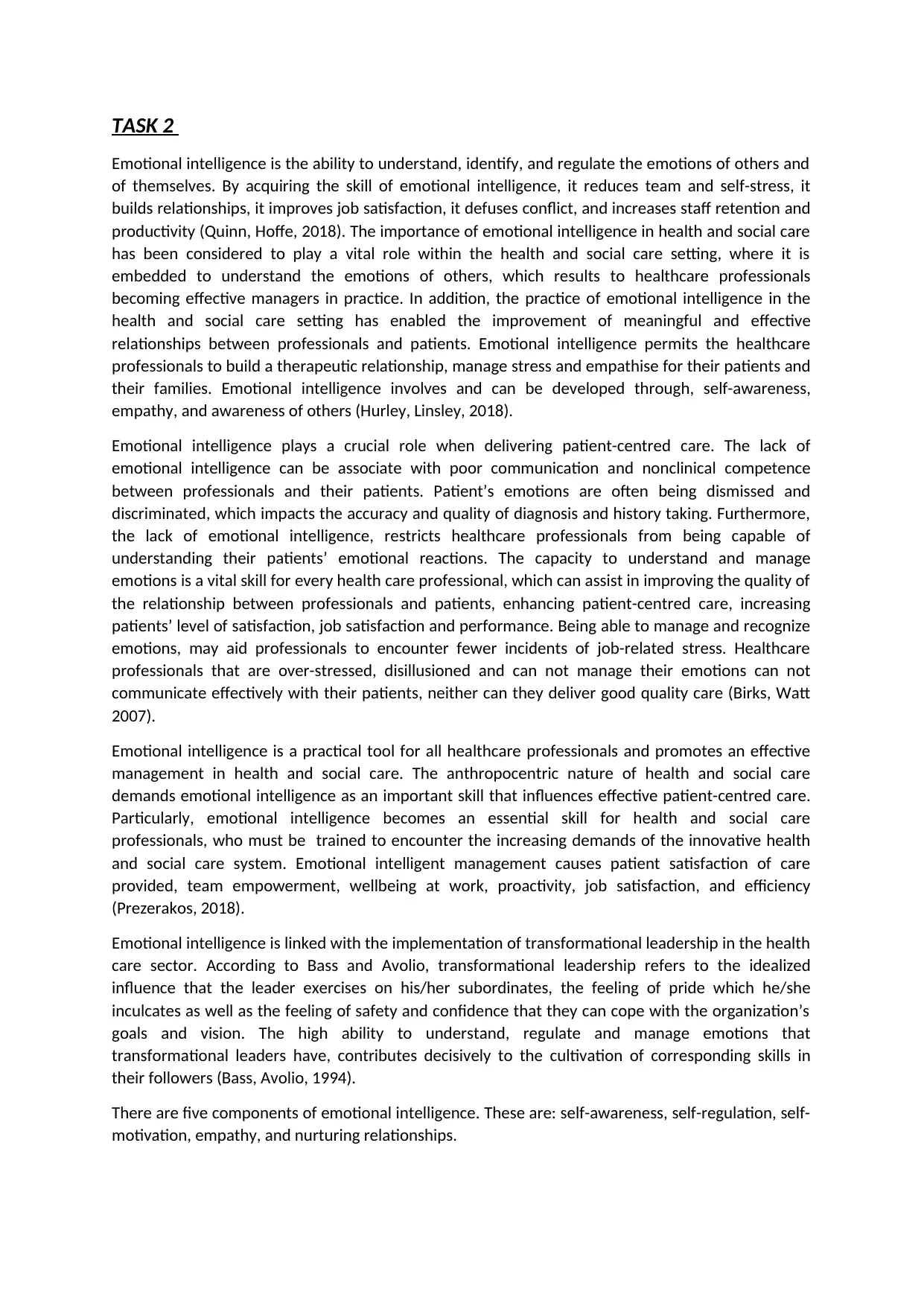
TASK 2
Emotional intelligence is the ability to understand, identify, and regulate the emotions of others and
of themselves. By acquiring the skill of emotional intelligence, it reduces team and self-stress, it
builds relationships, it improves job satisfaction, it defuses conflict, and increases staff retention and
productivity (Quinn, Hoffe, 2018). The importance of emotional intelligence in health and social care
has been considered to play a vital role within the health and social care setting, where it is
embedded to understand the emotions of others, which results to healthcare professionals
becoming effective managers in practice. In addition, the practice of emotional intelligence in the
health and social care setting has enabled the improvement of meaningful and effective
relationships between professionals and patients. Emotional intelligence permits the healthcare
professionals to build a therapeutic relationship, manage stress and empathise for their patients and
their families. Emotional intelligence involves and can be developed through, self-awareness,
empathy, and awareness of others (Hurley, Linsley, 2018).
Emotional intelligence plays a crucial role when delivering patient-centred care. The lack of
emotional intelligence can be associate with poor communication and nonclinical competence
between professionals and their patients. Patient’s emotions are often being dismissed and
discriminated, which impacts the accuracy and quality of diagnosis and history taking. Furthermore,
the lack of emotional intelligence, restricts healthcare professionals from being capable of
understanding their patients’ emotional reactions. The capacity to understand and manage
emotions is a vital skill for every health care professional, which can assist in improving the quality of
the relationship between professionals and patients, enhancing patient-centred care, increasing
patients’ level of satisfaction, job satisfaction and performance. Being able to manage and recognize
emotions, may aid professionals to encounter fewer incidents of job-related stress. Healthcare
professionals that are over-stressed, disillusioned and can not manage their emotions can not
communicate effectively with their patients, neither can they deliver good quality care (Birks, Watt
2007).
Emotional intelligence is a practical tool for all healthcare professionals and promotes an effective
management in health and social care. The anthropocentric nature of health and social care
demands emotional intelligence as an important skill that influences effective patient-centred care.
Particularly, emotional intelligence becomes an essential skill for health and social care
professionals, who must be trained to encounter the increasing demands of the innovative health
and social care system. Emotional intelligent management causes patient satisfaction of care
provided, team empowerment, wellbeing at work, proactivity, job satisfaction, and efficiency
(Prezerakos, 2018).
Emotional intelligence is linked with the implementation of transformational leadership in the health
care sector. According to Bass and Avolio, transformational leadership refers to the idealized
influence that the leader exercises on his/her subordinates, the feeling of pride which he/she
inculcates as well as the feeling of safety and confidence that they can cope with the organization’s
goals and vision. The high ability to understand, regulate and manage emotions that
transformational leaders have, contributes decisively to the cultivation of corresponding skills in
their followers (Bass, Avolio, 1994).
There are five components of emotional intelligence. These are: self-awareness, self-regulation, self-
motivation, empathy, and nurturing relationships.
Emotional intelligence is the ability to understand, identify, and regulate the emotions of others and
of themselves. By acquiring the skill of emotional intelligence, it reduces team and self-stress, it
builds relationships, it improves job satisfaction, it defuses conflict, and increases staff retention and
productivity (Quinn, Hoffe, 2018). The importance of emotional intelligence in health and social care
has been considered to play a vital role within the health and social care setting, where it is
embedded to understand the emotions of others, which results to healthcare professionals
becoming effective managers in practice. In addition, the practice of emotional intelligence in the
health and social care setting has enabled the improvement of meaningful and effective
relationships between professionals and patients. Emotional intelligence permits the healthcare
professionals to build a therapeutic relationship, manage stress and empathise for their patients and
their families. Emotional intelligence involves and can be developed through, self-awareness,
empathy, and awareness of others (Hurley, Linsley, 2018).
Emotional intelligence plays a crucial role when delivering patient-centred care. The lack of
emotional intelligence can be associate with poor communication and nonclinical competence
between professionals and their patients. Patient’s emotions are often being dismissed and
discriminated, which impacts the accuracy and quality of diagnosis and history taking. Furthermore,
the lack of emotional intelligence, restricts healthcare professionals from being capable of
understanding their patients’ emotional reactions. The capacity to understand and manage
emotions is a vital skill for every health care professional, which can assist in improving the quality of
the relationship between professionals and patients, enhancing patient-centred care, increasing
patients’ level of satisfaction, job satisfaction and performance. Being able to manage and recognize
emotions, may aid professionals to encounter fewer incidents of job-related stress. Healthcare
professionals that are over-stressed, disillusioned and can not manage their emotions can not
communicate effectively with their patients, neither can they deliver good quality care (Birks, Watt
2007).
Emotional intelligence is a practical tool for all healthcare professionals and promotes an effective
management in health and social care. The anthropocentric nature of health and social care
demands emotional intelligence as an important skill that influences effective patient-centred care.
Particularly, emotional intelligence becomes an essential skill for health and social care
professionals, who must be trained to encounter the increasing demands of the innovative health
and social care system. Emotional intelligent management causes patient satisfaction of care
provided, team empowerment, wellbeing at work, proactivity, job satisfaction, and efficiency
(Prezerakos, 2018).
Emotional intelligence is linked with the implementation of transformational leadership in the health
care sector. According to Bass and Avolio, transformational leadership refers to the idealized
influence that the leader exercises on his/her subordinates, the feeling of pride which he/she
inculcates as well as the feeling of safety and confidence that they can cope with the organization’s
goals and vision. The high ability to understand, regulate and manage emotions that
transformational leaders have, contributes decisively to the cultivation of corresponding skills in
their followers (Bass, Avolio, 1994).
There are five components of emotional intelligence. These are: self-awareness, self-regulation, self-
motivation, empathy, and nurturing relationships.
⊘ This is a preview!⊘
Do you want full access?
Subscribe today to unlock all pages.

Trusted by 1+ million students worldwide
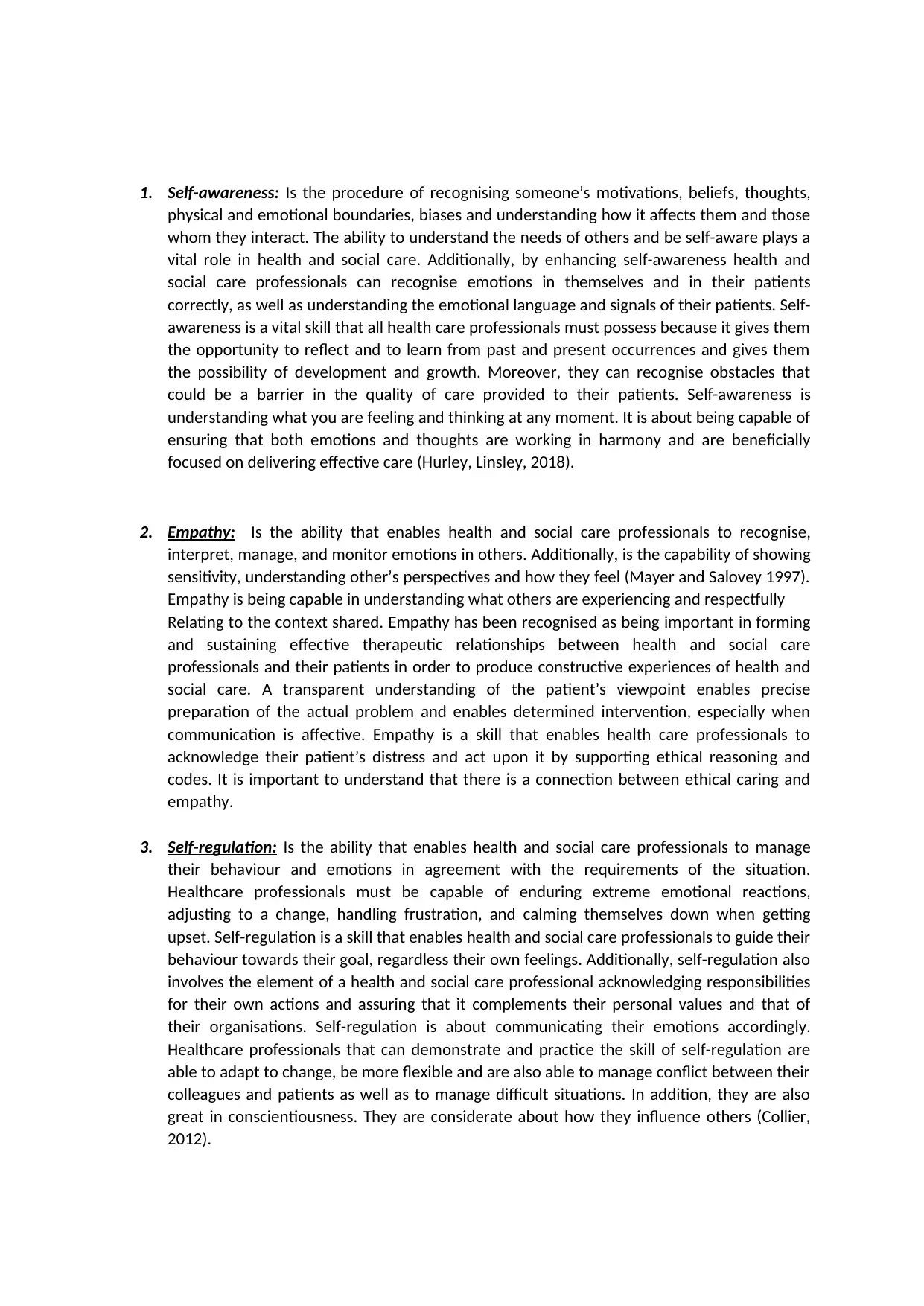
1. Self-awareness: Is the procedure of recognising someone’s motivations, beliefs, thoughts,
physical and emotional boundaries, biases and understanding how it affects them and those
whom they interact. The ability to understand the needs of others and be self-aware plays a
vital role in health and social care. Additionally, by enhancing self-awareness health and
social care professionals can recognise emotions in themselves and in their patients
correctly, as well as understanding the emotional language and signals of their patients. Self-
awareness is a vital skill that all health care professionals must possess because it gives them
the opportunity to reflect and to learn from past and present occurrences and gives them
the possibility of development and growth. Moreover, they can recognise obstacles that
could be a barrier in the quality of care provided to their patients. Self-awareness is
understanding what you are feeling and thinking at any moment. It is about being capable of
ensuring that both emotions and thoughts are working in harmony and are beneficially
focused on delivering effective care (Hurley, Linsley, 2018).
2. Empathy: Is the ability that enables health and social care professionals to recognise,
interpret, manage, and monitor emotions in others. Additionally, is the capability of showing
sensitivity, understanding other’s perspectives and how they feel (Mayer and Salovey 1997).
Empathy is being capable in understanding what others are experiencing and respectfully
Relating to the context shared. Empathy has been recognised as being important in forming
and sustaining effective therapeutic relationships between health and social care
professionals and their patients in order to produce constructive experiences of health and
social care. A transparent understanding of the patient’s viewpoint enables precise
preparation of the actual problem and enables determined intervention, especially when
communication is affective. Empathy is a skill that enables health care professionals to
acknowledge their patient’s distress and act upon it by supporting ethical reasoning and
codes. It is important to understand that there is a connection between ethical caring and
empathy.
3. Self-regulation: Is the ability that enables health and social care professionals to manage
their behaviour and emotions in agreement with the requirements of the situation.
Healthcare professionals must be capable of enduring extreme emotional reactions,
adjusting to a change, handling frustration, and calming themselves down when getting
upset. Self-regulation is a skill that enables health and social care professionals to guide their
behaviour towards their goal, regardless their own feelings. Additionally, self-regulation also
involves the element of a health and social care professional acknowledging responsibilities
for their own actions and assuring that it complements their personal values and that of
their organisations. Self-regulation is about communicating their emotions accordingly.
Healthcare professionals that can demonstrate and practice the skill of self-regulation are
able to adapt to change, be more flexible and are also able to manage conflict between their
colleagues and patients as well as to manage difficult situations. In addition, they are also
great in conscientiousness. They are considerate about how they influence others (Collier,
2012).
physical and emotional boundaries, biases and understanding how it affects them and those
whom they interact. The ability to understand the needs of others and be self-aware plays a
vital role in health and social care. Additionally, by enhancing self-awareness health and
social care professionals can recognise emotions in themselves and in their patients
correctly, as well as understanding the emotional language and signals of their patients. Self-
awareness is a vital skill that all health care professionals must possess because it gives them
the opportunity to reflect and to learn from past and present occurrences and gives them
the possibility of development and growth. Moreover, they can recognise obstacles that
could be a barrier in the quality of care provided to their patients. Self-awareness is
understanding what you are feeling and thinking at any moment. It is about being capable of
ensuring that both emotions and thoughts are working in harmony and are beneficially
focused on delivering effective care (Hurley, Linsley, 2018).
2. Empathy: Is the ability that enables health and social care professionals to recognise,
interpret, manage, and monitor emotions in others. Additionally, is the capability of showing
sensitivity, understanding other’s perspectives and how they feel (Mayer and Salovey 1997).
Empathy is being capable in understanding what others are experiencing and respectfully
Relating to the context shared. Empathy has been recognised as being important in forming
and sustaining effective therapeutic relationships between health and social care
professionals and their patients in order to produce constructive experiences of health and
social care. A transparent understanding of the patient’s viewpoint enables precise
preparation of the actual problem and enables determined intervention, especially when
communication is affective. Empathy is a skill that enables health care professionals to
acknowledge their patient’s distress and act upon it by supporting ethical reasoning and
codes. It is important to understand that there is a connection between ethical caring and
empathy.
3. Self-regulation: Is the ability that enables health and social care professionals to manage
their behaviour and emotions in agreement with the requirements of the situation.
Healthcare professionals must be capable of enduring extreme emotional reactions,
adjusting to a change, handling frustration, and calming themselves down when getting
upset. Self-regulation is a skill that enables health and social care professionals to guide their
behaviour towards their goal, regardless their own feelings. Additionally, self-regulation also
involves the element of a health and social care professional acknowledging responsibilities
for their own actions and assuring that it complements their personal values and that of
their organisations. Self-regulation is about communicating their emotions accordingly.
Healthcare professionals that can demonstrate and practice the skill of self-regulation are
able to adapt to change, be more flexible and are also able to manage conflict between their
colleagues and patients as well as to manage difficult situations. In addition, they are also
great in conscientiousness. They are considerate about how they influence others (Collier,
2012).
Paraphrase This Document
Need a fresh take? Get an instant paraphrase of this document with our AI Paraphraser
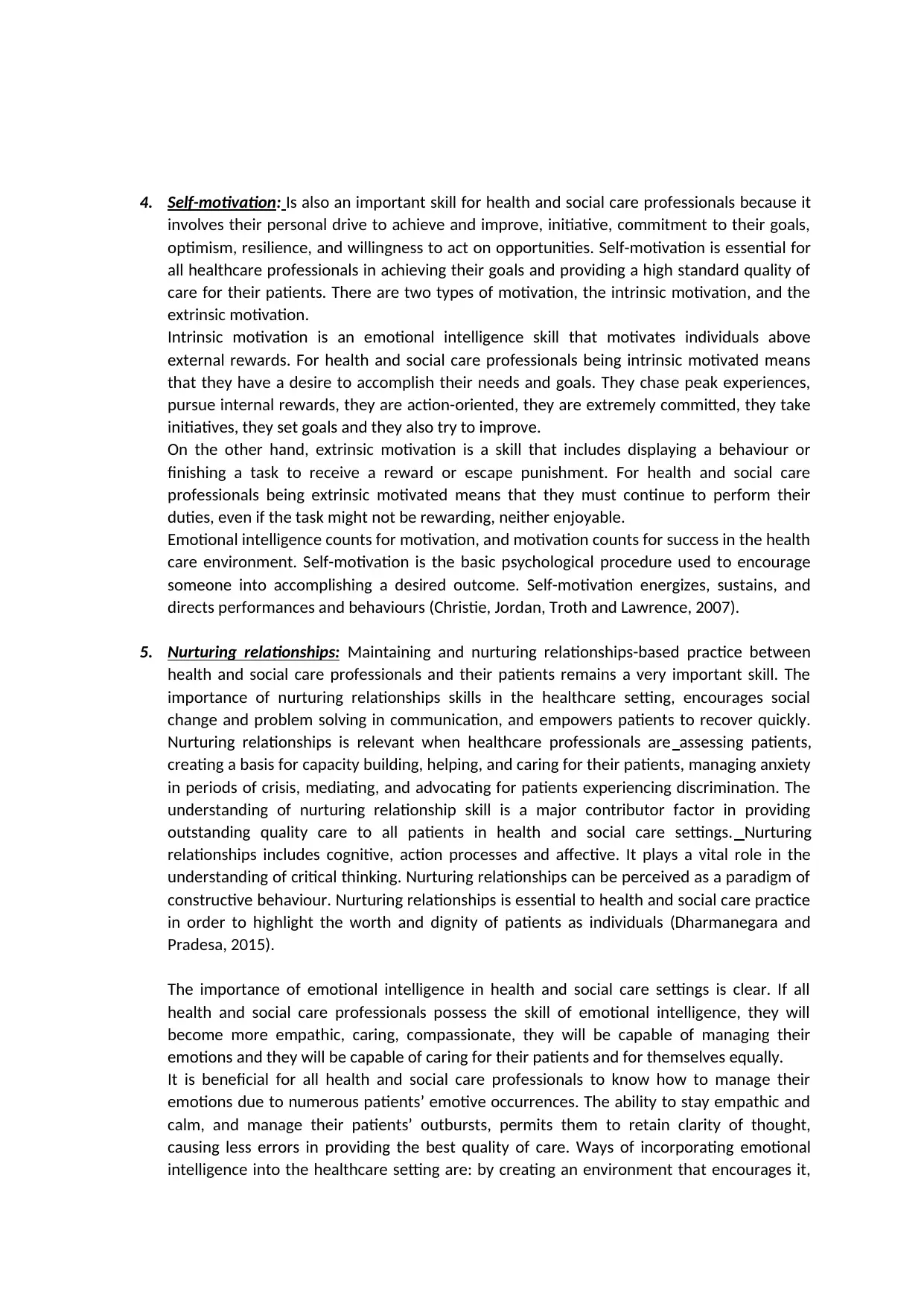
4. Self-motivation: Is also an important skill for health and social care professionals because it
involves their personal drive to achieve and improve, initiative, commitment to their goals,
optimism, resilience, and willingness to act on opportunities. Self-motivation is essential for
all healthcare professionals in achieving their goals and providing a high standard quality of
care for their patients. There are two types of motivation, the intrinsic motivation, and the
extrinsic motivation.
Intrinsic motivation is an emotional intelligence skill that motivates individuals above
external rewards. For health and social care professionals being intrinsic motivated means
that they have a desire to accomplish their needs and goals. They chase peak experiences,
pursue internal rewards, they are action-oriented, they are extremely committed, they take
initiatives, they set goals and they also try to improve.
On the other hand, extrinsic motivation is a skill that includes displaying a behaviour or
finishing a task to receive a reward or escape punishment. For health and social care
professionals being extrinsic motivated means that they must continue to perform their
duties, even if the task might not be rewarding, neither enjoyable.
Emotional intelligence counts for motivation, and motivation counts for success in the health
care environment. Self-motivation is the basic psychological procedure used to encourage
someone into accomplishing a desired outcome. Self-motivation energizes, sustains, and
directs performances and behaviours (Christie, Jordan, Troth and Lawrence, 2007).
5. Nurturing relationships: Maintaining and nurturing relationships-based practice between
health and social care professionals and their patients remains a very important skill. The
importance of nurturing relationships skills in the healthcare setting, encourages social
change and problem solving in communication, and empowers patients to recover quickly.
Nurturing relationships is relevant when healthcare professionals are assessing patients,
creating a basis for capacity building, helping, and caring for their patients, managing anxiety
in periods of crisis, mediating, and advocating for patients experiencing discrimination. The
understanding of nurturing relationship skill is a major contributor factor in providing
outstanding quality care to all patients in health and social care settings. Nurturing
relationships includes cognitive, action processes and affective. It plays a vital role in the
understanding of critical thinking. Nurturing relationships can be perceived as a paradigm of
constructive behaviour. Nurturing relationships is essential to health and social care practice
in order to highlight the worth and dignity of patients as individuals (Dharmanegara and
Pradesa, 2015).
The importance of emotional intelligence in health and social care settings is clear. If all
health and social care professionals possess the skill of emotional intelligence, they will
become more empathic, caring, compassionate, they will be capable of managing their
emotions and they will be capable of caring for their patients and for themselves equally.
It is beneficial for all health and social care professionals to know how to manage their
emotions due to numerous patients’ emotive occurrences. The ability to stay empathic and
calm, and manage their patients’ outbursts, permits them to retain clarity of thought,
causing less errors in providing the best quality of care. Ways of incorporating emotional
intelligence into the healthcare setting are: by creating an environment that encourages it,
involves their personal drive to achieve and improve, initiative, commitment to their goals,
optimism, resilience, and willingness to act on opportunities. Self-motivation is essential for
all healthcare professionals in achieving their goals and providing a high standard quality of
care for their patients. There are two types of motivation, the intrinsic motivation, and the
extrinsic motivation.
Intrinsic motivation is an emotional intelligence skill that motivates individuals above
external rewards. For health and social care professionals being intrinsic motivated means
that they have a desire to accomplish their needs and goals. They chase peak experiences,
pursue internal rewards, they are action-oriented, they are extremely committed, they take
initiatives, they set goals and they also try to improve.
On the other hand, extrinsic motivation is a skill that includes displaying a behaviour or
finishing a task to receive a reward or escape punishment. For health and social care
professionals being extrinsic motivated means that they must continue to perform their
duties, even if the task might not be rewarding, neither enjoyable.
Emotional intelligence counts for motivation, and motivation counts for success in the health
care environment. Self-motivation is the basic psychological procedure used to encourage
someone into accomplishing a desired outcome. Self-motivation energizes, sustains, and
directs performances and behaviours (Christie, Jordan, Troth and Lawrence, 2007).
5. Nurturing relationships: Maintaining and nurturing relationships-based practice between
health and social care professionals and their patients remains a very important skill. The
importance of nurturing relationships skills in the healthcare setting, encourages social
change and problem solving in communication, and empowers patients to recover quickly.
Nurturing relationships is relevant when healthcare professionals are assessing patients,
creating a basis for capacity building, helping, and caring for their patients, managing anxiety
in periods of crisis, mediating, and advocating for patients experiencing discrimination. The
understanding of nurturing relationship skill is a major contributor factor in providing
outstanding quality care to all patients in health and social care settings. Nurturing
relationships includes cognitive, action processes and affective. It plays a vital role in the
understanding of critical thinking. Nurturing relationships can be perceived as a paradigm of
constructive behaviour. Nurturing relationships is essential to health and social care practice
in order to highlight the worth and dignity of patients as individuals (Dharmanegara and
Pradesa, 2015).
The importance of emotional intelligence in health and social care settings is clear. If all
health and social care professionals possess the skill of emotional intelligence, they will
become more empathic, caring, compassionate, they will be capable of managing their
emotions and they will be capable of caring for their patients and for themselves equally.
It is beneficial for all health and social care professionals to know how to manage their
emotions due to numerous patients’ emotive occurrences. The ability to stay empathic and
calm, and manage their patients’ outbursts, permits them to retain clarity of thought,
causing less errors in providing the best quality of care. Ways of incorporating emotional
intelligence into the healthcare setting are: by creating an environment that encourages it,
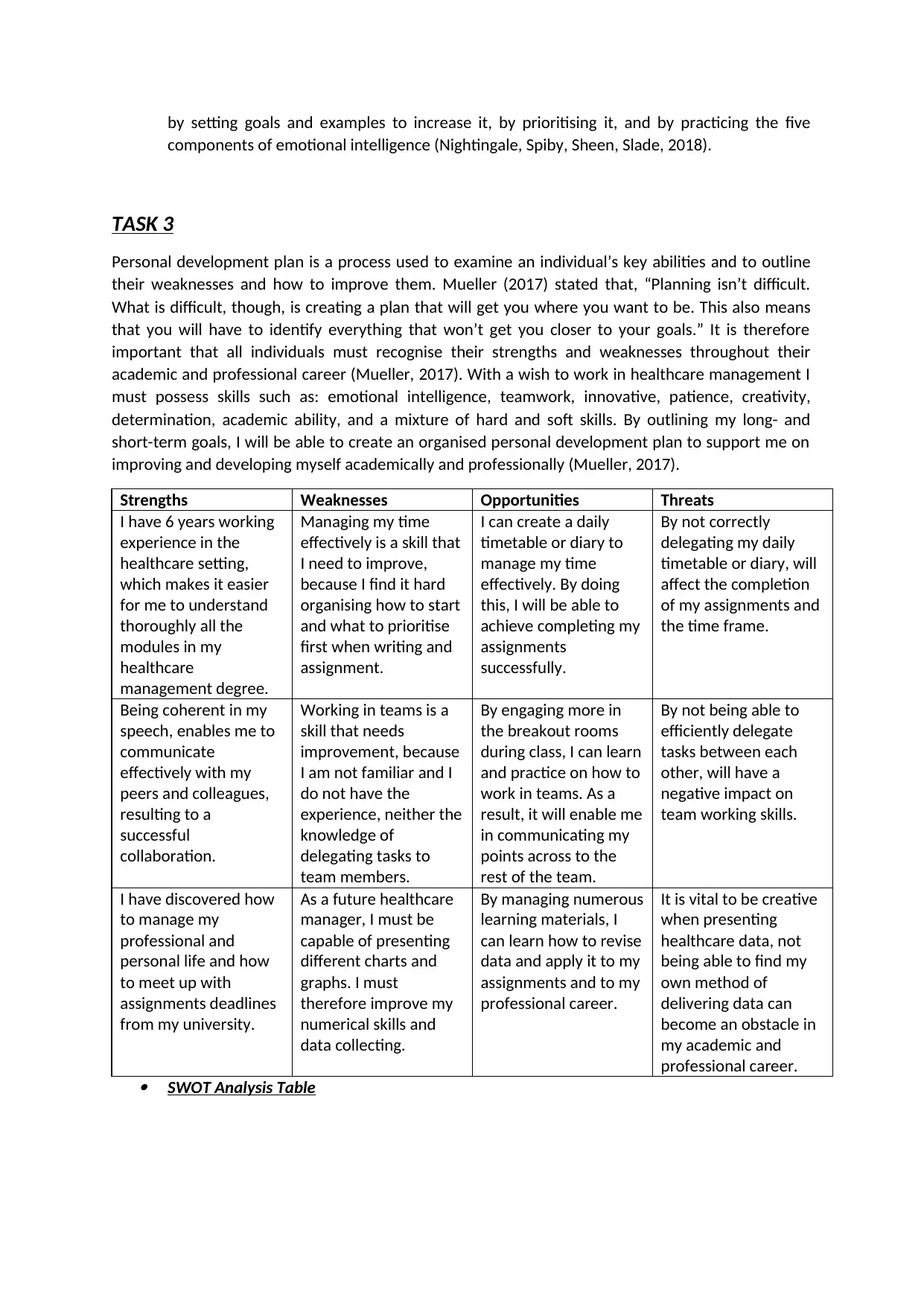
by setting goals and examples to increase it, by prioritising it, and by practicing the five
components of emotional intelligence (Nightingale, Spiby, Sheen, Slade, 2018).
TASK 3
Personal development plan is a process used to examine an individual’s key abilities and to outline
their weaknesses and how to improve them. Mueller (2017) stated that, “Planning isn’t difficult.
What is difficult, though, is creating a plan that will get you where you want to be. This also means
that you will have to identify everything that won’t get you closer to your goals.” It is therefore
important that all individuals must recognise their strengths and weaknesses throughout their
academic and professional career (Mueller, 2017). With a wish to work in healthcare management I
must possess skills such as: emotional intelligence, teamwork, innovative, patience, creativity,
determination, academic ability, and a mixture of hard and soft skills. By outlining my long- and
short-term goals, I will be able to create an organised personal development plan to support me on
improving and developing myself academically and professionally (Mueller, 2017).
Strengths Weaknesses Opportunities Threats
I have 6 years working
experience in the
healthcare setting,
which makes it easier
for me to understand
thoroughly all the
modules in my
healthcare
management degree.
Managing my time
effectively is a skill that
I need to improve,
because I find it hard
organising how to start
and what to prioritise
first when writing and
assignment.
I can create a daily
timetable or diary to
manage my time
effectively. By doing
this, I will be able to
achieve completing my
assignments
successfully.
By not correctly
delegating my daily
timetable or diary, will
affect the completion
of my assignments and
the time frame.
Being coherent in my
speech, enables me to
communicate
effectively with my
peers and colleagues,
resulting to a
successful
collaboration.
Working in teams is a
skill that needs
improvement, because
I am not familiar and I
do not have the
experience, neither the
knowledge of
delegating tasks to
team members.
By engaging more in
the breakout rooms
during class, I can learn
and practice on how to
work in teams. As a
result, it will enable me
in communicating my
points across to the
rest of the team.
By not being able to
efficiently delegate
tasks between each
other, will have a
negative impact on
team working skills.
I have discovered how
to manage my
professional and
personal life and how
to meet up with
assignments deadlines
from my university.
As a future healthcare
manager, I must be
capable of presenting
different charts and
graphs. I must
therefore improve my
numerical skills and
data collecting.
By managing numerous
learning materials, I
can learn how to revise
data and apply it to my
assignments and to my
professional career.
It is vital to be creative
when presenting
healthcare data, not
being able to find my
own method of
delivering data can
become an obstacle in
my academic and
professional career.
SWOT Analysis Table
components of emotional intelligence (Nightingale, Spiby, Sheen, Slade, 2018).
TASK 3
Personal development plan is a process used to examine an individual’s key abilities and to outline
their weaknesses and how to improve them. Mueller (2017) stated that, “Planning isn’t difficult.
What is difficult, though, is creating a plan that will get you where you want to be. This also means
that you will have to identify everything that won’t get you closer to your goals.” It is therefore
important that all individuals must recognise their strengths and weaknesses throughout their
academic and professional career (Mueller, 2017). With a wish to work in healthcare management I
must possess skills such as: emotional intelligence, teamwork, innovative, patience, creativity,
determination, academic ability, and a mixture of hard and soft skills. By outlining my long- and
short-term goals, I will be able to create an organised personal development plan to support me on
improving and developing myself academically and professionally (Mueller, 2017).
Strengths Weaknesses Opportunities Threats
I have 6 years working
experience in the
healthcare setting,
which makes it easier
for me to understand
thoroughly all the
modules in my
healthcare
management degree.
Managing my time
effectively is a skill that
I need to improve,
because I find it hard
organising how to start
and what to prioritise
first when writing and
assignment.
I can create a daily
timetable or diary to
manage my time
effectively. By doing
this, I will be able to
achieve completing my
assignments
successfully.
By not correctly
delegating my daily
timetable or diary, will
affect the completion
of my assignments and
the time frame.
Being coherent in my
speech, enables me to
communicate
effectively with my
peers and colleagues,
resulting to a
successful
collaboration.
Working in teams is a
skill that needs
improvement, because
I am not familiar and I
do not have the
experience, neither the
knowledge of
delegating tasks to
team members.
By engaging more in
the breakout rooms
during class, I can learn
and practice on how to
work in teams. As a
result, it will enable me
in communicating my
points across to the
rest of the team.
By not being able to
efficiently delegate
tasks between each
other, will have a
negative impact on
team working skills.
I have discovered how
to manage my
professional and
personal life and how
to meet up with
assignments deadlines
from my university.
As a future healthcare
manager, I must be
capable of presenting
different charts and
graphs. I must
therefore improve my
numerical skills and
data collecting.
By managing numerous
learning materials, I
can learn how to revise
data and apply it to my
assignments and to my
professional career.
It is vital to be creative
when presenting
healthcare data, not
being able to find my
own method of
delivering data can
become an obstacle in
my academic and
professional career.
SWOT Analysis Table
⊘ This is a preview!⊘
Do you want full access?
Subscribe today to unlock all pages.

Trusted by 1+ million students worldwide
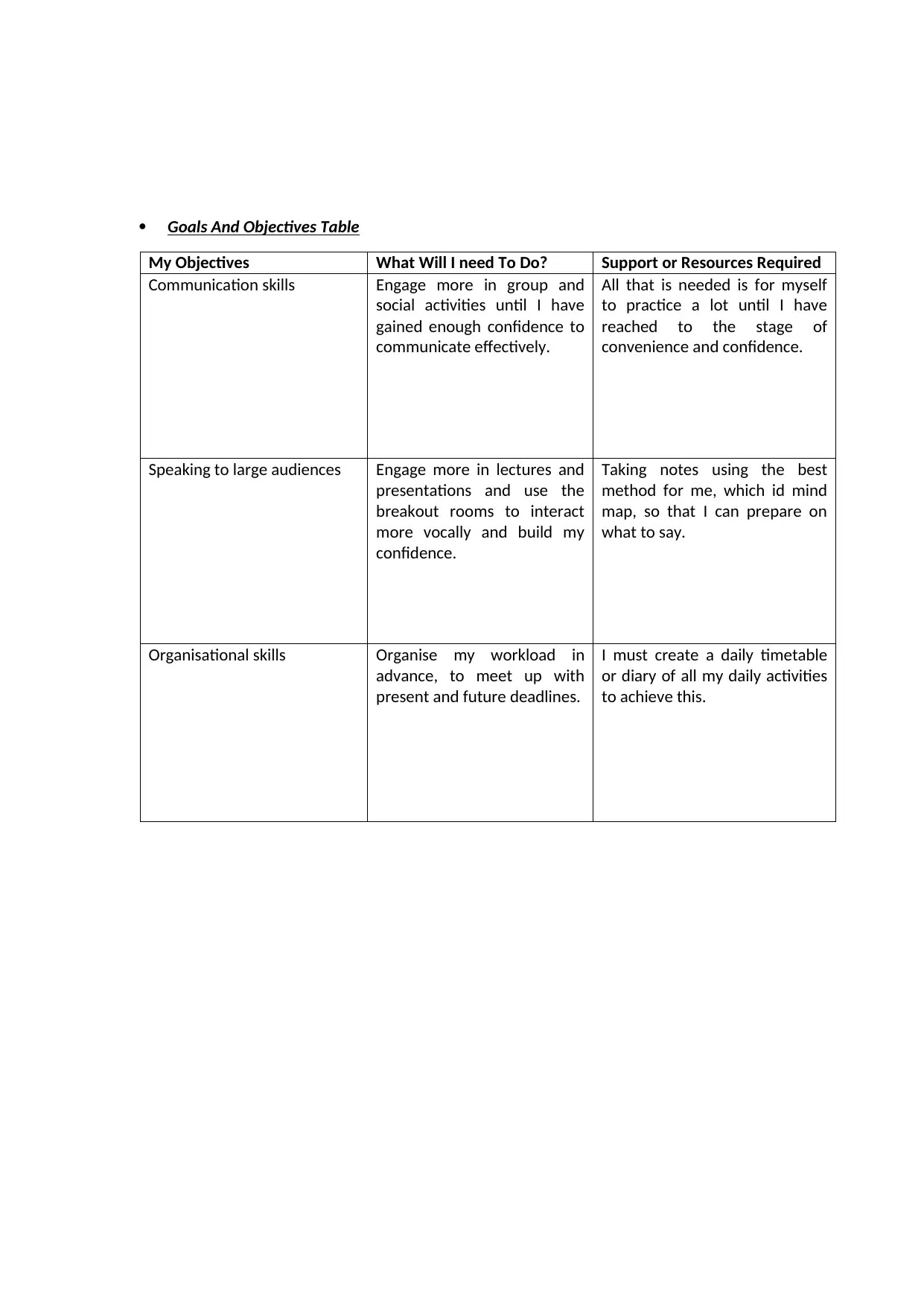
Goals And Objectives Table
My Objectives What Will I need To Do? Support or Resources Required
Communication skills Engage more in group and
social activities until I have
gained enough confidence to
communicate effectively.
All that is needed is for myself
to practice a lot until I have
reached to the stage of
convenience and confidence.
Speaking to large audiences Engage more in lectures and
presentations and use the
breakout rooms to interact
more vocally and build my
confidence.
Taking notes using the best
method for me, which id mind
map, so that I can prepare on
what to say.
Organisational skills Organise my workload in
advance, to meet up with
present and future deadlines.
I must create a daily timetable
or diary of all my daily activities
to achieve this.
My Objectives What Will I need To Do? Support or Resources Required
Communication skills Engage more in group and
social activities until I have
gained enough confidence to
communicate effectively.
All that is needed is for myself
to practice a lot until I have
reached to the stage of
convenience and confidence.
Speaking to large audiences Engage more in lectures and
presentations and use the
breakout rooms to interact
more vocally and build my
confidence.
Taking notes using the best
method for me, which id mind
map, so that I can prepare on
what to say.
Organisational skills Organise my workload in
advance, to meet up with
present and future deadlines.
I must create a daily timetable
or diary of all my daily activities
to achieve this.
Paraphrase This Document
Need a fresh take? Get an instant paraphrase of this document with our AI Paraphraser
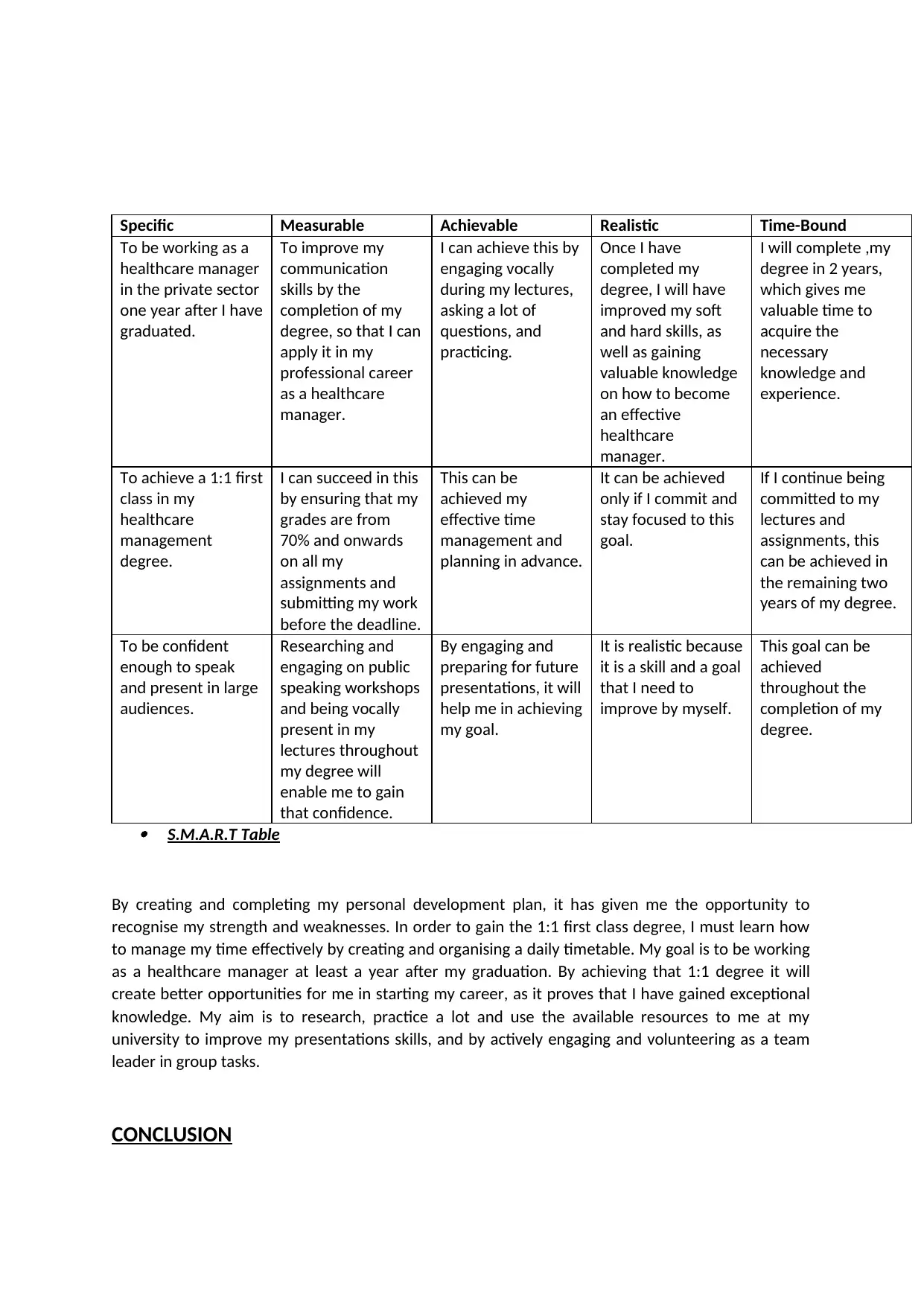
Specific Measurable Achievable Realistic Time-Bound
To be working as a
healthcare manager
in the private sector
one year after I have
graduated.
To improve my
communication
skills by the
completion of my
degree, so that I can
apply it in my
professional career
as a healthcare
manager.
I can achieve this by
engaging vocally
during my lectures,
asking a lot of
questions, and
practicing.
Once I have
completed my
degree, I will have
improved my soft
and hard skills, as
well as gaining
valuable knowledge
on how to become
an effective
healthcare
manager.
I will complete ,my
degree in 2 years,
which gives me
valuable time to
acquire the
necessary
knowledge and
experience.
To achieve a 1:1 first
class in my
healthcare
management
degree.
I can succeed in this
by ensuring that my
grades are from
70% and onwards
on all my
assignments and
submitting my work
before the deadline.
This can be
achieved my
effective time
management and
planning in advance.
It can be achieved
only if I commit and
stay focused to this
goal.
If I continue being
committed to my
lectures and
assignments, this
can be achieved in
the remaining two
years of my degree.
To be confident
enough to speak
and present in large
audiences.
Researching and
engaging on public
speaking workshops
and being vocally
present in my
lectures throughout
my degree will
enable me to gain
that confidence.
By engaging and
preparing for future
presentations, it will
help me in achieving
my goal.
It is realistic because
it is a skill and a goal
that I need to
improve by myself.
This goal can be
achieved
throughout the
completion of my
degree.
S.M.A.R.T Table
By creating and completing my personal development plan, it has given me the opportunity to
recognise my strength and weaknesses. In order to gain the 1:1 first class degree, I must learn how
to manage my time effectively by creating and organising a daily timetable. My goal is to be working
as a healthcare manager at least a year after my graduation. By achieving that 1:1 degree it will
create better opportunities for me in starting my career, as it proves that I have gained exceptional
knowledge. My aim is to research, practice a lot and use the available resources to me at my
university to improve my presentations skills, and by actively engaging and volunteering as a team
leader in group tasks.
CONCLUSION
To be working as a
healthcare manager
in the private sector
one year after I have
graduated.
To improve my
communication
skills by the
completion of my
degree, so that I can
apply it in my
professional career
as a healthcare
manager.
I can achieve this by
engaging vocally
during my lectures,
asking a lot of
questions, and
practicing.
Once I have
completed my
degree, I will have
improved my soft
and hard skills, as
well as gaining
valuable knowledge
on how to become
an effective
healthcare
manager.
I will complete ,my
degree in 2 years,
which gives me
valuable time to
acquire the
necessary
knowledge and
experience.
To achieve a 1:1 first
class in my
healthcare
management
degree.
I can succeed in this
by ensuring that my
grades are from
70% and onwards
on all my
assignments and
submitting my work
before the deadline.
This can be
achieved my
effective time
management and
planning in advance.
It can be achieved
only if I commit and
stay focused to this
goal.
If I continue being
committed to my
lectures and
assignments, this
can be achieved in
the remaining two
years of my degree.
To be confident
enough to speak
and present in large
audiences.
Researching and
engaging on public
speaking workshops
and being vocally
present in my
lectures throughout
my degree will
enable me to gain
that confidence.
By engaging and
preparing for future
presentations, it will
help me in achieving
my goal.
It is realistic because
it is a skill and a goal
that I need to
improve by myself.
This goal can be
achieved
throughout the
completion of my
degree.
S.M.A.R.T Table
By creating and completing my personal development plan, it has given me the opportunity to
recognise my strength and weaknesses. In order to gain the 1:1 first class degree, I must learn how
to manage my time effectively by creating and organising a daily timetable. My goal is to be working
as a healthcare manager at least a year after my graduation. By achieving that 1:1 degree it will
create better opportunities for me in starting my career, as it proves that I have gained exceptional
knowledge. My aim is to research, practice a lot and use the available resources to me at my
university to improve my presentations skills, and by actively engaging and volunteering as a team
leader in group tasks.
CONCLUSION
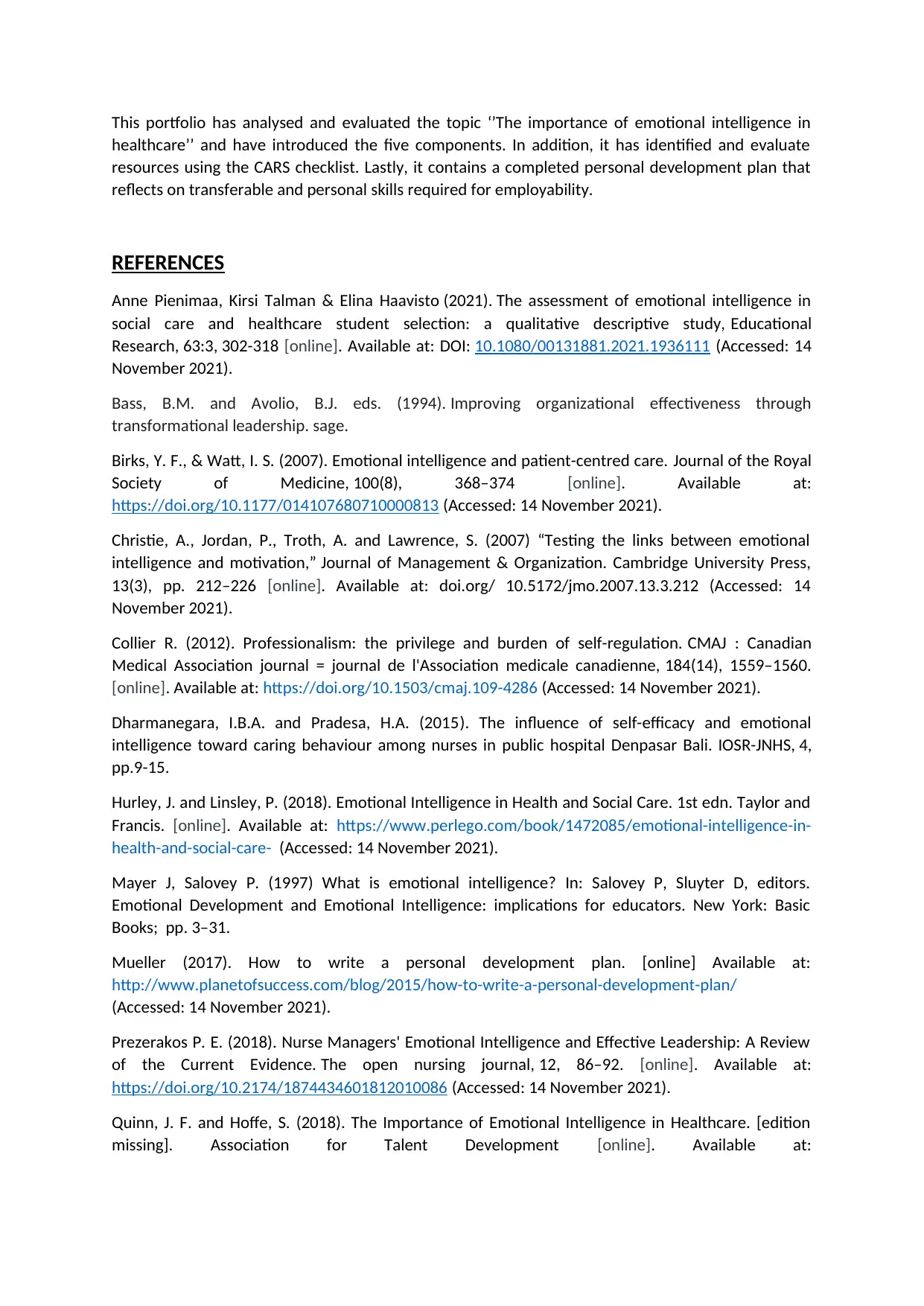
This portfolio has analysed and evaluated the topic ‘’The importance of emotional intelligence in
healthcare’’ and have introduced the five components. In addition, it has identified and evaluate
resources using the CARS checklist. Lastly, it contains a completed personal development plan that
reflects on transferable and personal skills required for employability.
REFERENCES
Anne Pienimaa, Kirsi Talman & Elina Haavisto (2021). The assessment of emotional intelligence in
social care and healthcare student selection: a qualitative descriptive study, Educational
Research, 63:3, 302-318 [online]. Available at: DOI: 10.1080/00131881.2021.1936111 (Accessed: 14
November 2021).
Bass, B.M. and Avolio, B.J. eds. (1994). Improving organizational effectiveness through
transformational leadership. sage.
Birks, Y. F., & Watt, I. S. (2007). Emotional intelligence and patient-centred care. Journal of the Royal
Society of Medicine, 100(8), 368–374 [online]. Available at:
https://doi.org/10.1177/014107680710000813 (Accessed: 14 November 2021).
Christie, A., Jordan, P., Troth, A. and Lawrence, S. (2007) “Testing the links between emotional
intelligence and motivation,” Journal of Management & Organization. Cambridge University Press,
13(3), pp. 212–226 [online]. Available at: doi.org/ 10.5172/jmo.2007.13.3.212 (Accessed: 14
November 2021).
Collier R. (2012). Professionalism: the privilege and burden of self-regulation. CMAJ : Canadian
Medical Association journal = journal de l'Association medicale canadienne, 184(14), 1559–1560.
[online]. Available at: https://doi.org/10.1503/cmaj.109-4286 (Accessed: 14 November 2021).
Dharmanegara, I.B.A. and Pradesa, H.A. (2015). The influence of self-efficacy and emotional
intelligence toward caring behaviour among nurses in public hospital Denpasar Bali. IOSR-JNHS, 4,
pp.9-15.
Hurley, J. and Linsley, P. (2018). Emotional Intelligence in Health and Social Care. 1st edn. Taylor and
Francis. [online]. Available at: https://www.perlego.com/book/1472085/emotional-intelligence-in-
health-and-social-care- (Accessed: 14 November 2021).
Mayer J, Salovey P. (1997) What is emotional intelligence? In: Salovey P, Sluyter D, editors.
Emotional Development and Emotional Intelligence: implications for educators. New York: Basic
Books; pp. 3–31.
Mueller (2017). How to write a personal development plan. [online] Available at:
http://www.planetofsuccess.com/blog/2015/how-to-write-a-personal-development-plan/
(Accessed: 14 November 2021).
Prezerakos P. E. (2018). Nurse Managers' Emotional Intelligence and Effective Leadership: A Review
of the Current Evidence. The open nursing journal, 12, 86–92. [online]. Available at:
https://doi.org/10.2174/1874434601812010086 (Accessed: 14 November 2021).
Quinn, J. F. and Hoffe, S. (2018). The Importance of Emotional Intelligence in Healthcare. [edition
missing]. Association for Talent Development [online]. Available at:
healthcare’’ and have introduced the five components. In addition, it has identified and evaluate
resources using the CARS checklist. Lastly, it contains a completed personal development plan that
reflects on transferable and personal skills required for employability.
REFERENCES
Anne Pienimaa, Kirsi Talman & Elina Haavisto (2021). The assessment of emotional intelligence in
social care and healthcare student selection: a qualitative descriptive study, Educational
Research, 63:3, 302-318 [online]. Available at: DOI: 10.1080/00131881.2021.1936111 (Accessed: 14
November 2021).
Bass, B.M. and Avolio, B.J. eds. (1994). Improving organizational effectiveness through
transformational leadership. sage.
Birks, Y. F., & Watt, I. S. (2007). Emotional intelligence and patient-centred care. Journal of the Royal
Society of Medicine, 100(8), 368–374 [online]. Available at:
https://doi.org/10.1177/014107680710000813 (Accessed: 14 November 2021).
Christie, A., Jordan, P., Troth, A. and Lawrence, S. (2007) “Testing the links between emotional
intelligence and motivation,” Journal of Management & Organization. Cambridge University Press,
13(3), pp. 212–226 [online]. Available at: doi.org/ 10.5172/jmo.2007.13.3.212 (Accessed: 14
November 2021).
Collier R. (2012). Professionalism: the privilege and burden of self-regulation. CMAJ : Canadian
Medical Association journal = journal de l'Association medicale canadienne, 184(14), 1559–1560.
[online]. Available at: https://doi.org/10.1503/cmaj.109-4286 (Accessed: 14 November 2021).
Dharmanegara, I.B.A. and Pradesa, H.A. (2015). The influence of self-efficacy and emotional
intelligence toward caring behaviour among nurses in public hospital Denpasar Bali. IOSR-JNHS, 4,
pp.9-15.
Hurley, J. and Linsley, P. (2018). Emotional Intelligence in Health and Social Care. 1st edn. Taylor and
Francis. [online]. Available at: https://www.perlego.com/book/1472085/emotional-intelligence-in-
health-and-social-care- (Accessed: 14 November 2021).
Mayer J, Salovey P. (1997) What is emotional intelligence? In: Salovey P, Sluyter D, editors.
Emotional Development and Emotional Intelligence: implications for educators. New York: Basic
Books; pp. 3–31.
Mueller (2017). How to write a personal development plan. [online] Available at:
http://www.planetofsuccess.com/blog/2015/how-to-write-a-personal-development-plan/
(Accessed: 14 November 2021).
Prezerakos P. E. (2018). Nurse Managers' Emotional Intelligence and Effective Leadership: A Review
of the Current Evidence. The open nursing journal, 12, 86–92. [online]. Available at:
https://doi.org/10.2174/1874434601812010086 (Accessed: 14 November 2021).
Quinn, J. F. and Hoffe, S. (2018). The Importance of Emotional Intelligence in Healthcare. [edition
missing]. Association for Talent Development [online]. Available at:
⊘ This is a preview!⊘
Do you want full access?
Subscribe today to unlock all pages.

Trusted by 1+ million students worldwide
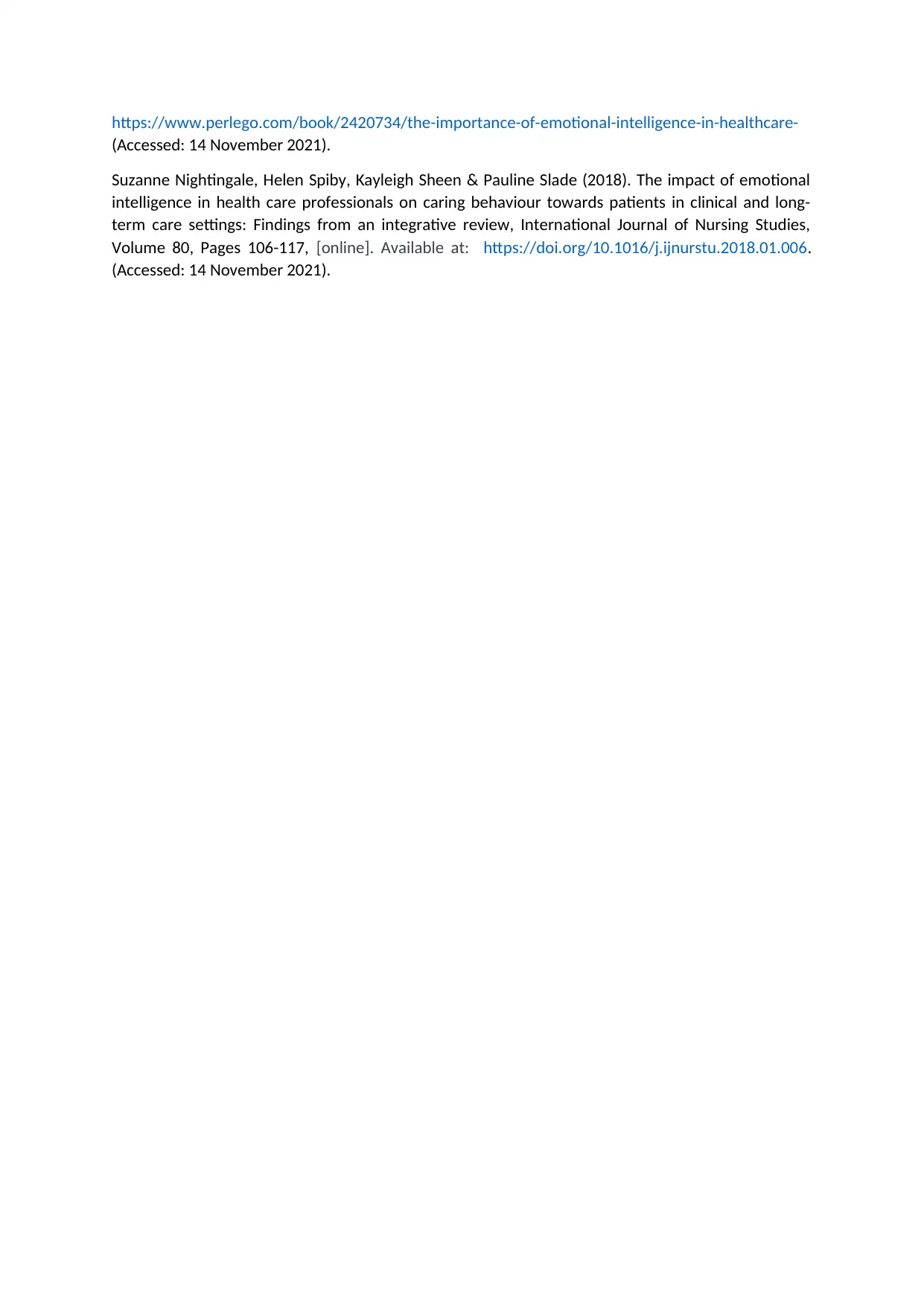
https://www.perlego.com/book/2420734/the-importance-of-emotional-intelligence-in-healthcare-
(Accessed: 14 November 2021).
Suzanne Nightingale, Helen Spiby, Kayleigh Sheen & Pauline Slade (2018). The impact of emotional
intelligence in health care professionals on caring behaviour towards patients in clinical and long-
term care settings: Findings from an integrative review, International Journal of Nursing Studies,
Volume 80, Pages 106-117, [online]. Available at: https://doi.org/10.1016/j.ijnurstu.2018.01.006.
(Accessed: 14 November 2021).
(Accessed: 14 November 2021).
Suzanne Nightingale, Helen Spiby, Kayleigh Sheen & Pauline Slade (2018). The impact of emotional
intelligence in health care professionals on caring behaviour towards patients in clinical and long-
term care settings: Findings from an integrative review, International Journal of Nursing Studies,
Volume 80, Pages 106-117, [online]. Available at: https://doi.org/10.1016/j.ijnurstu.2018.01.006.
(Accessed: 14 November 2021).
1 out of 10
Related Documents
Your All-in-One AI-Powered Toolkit for Academic Success.
+13062052269
info@desklib.com
Available 24*7 on WhatsApp / Email
![[object Object]](/_next/static/media/star-bottom.7253800d.svg)
Unlock your academic potential
Copyright © 2020–2026 A2Z Services. All Rights Reserved. Developed and managed by ZUCOL.




